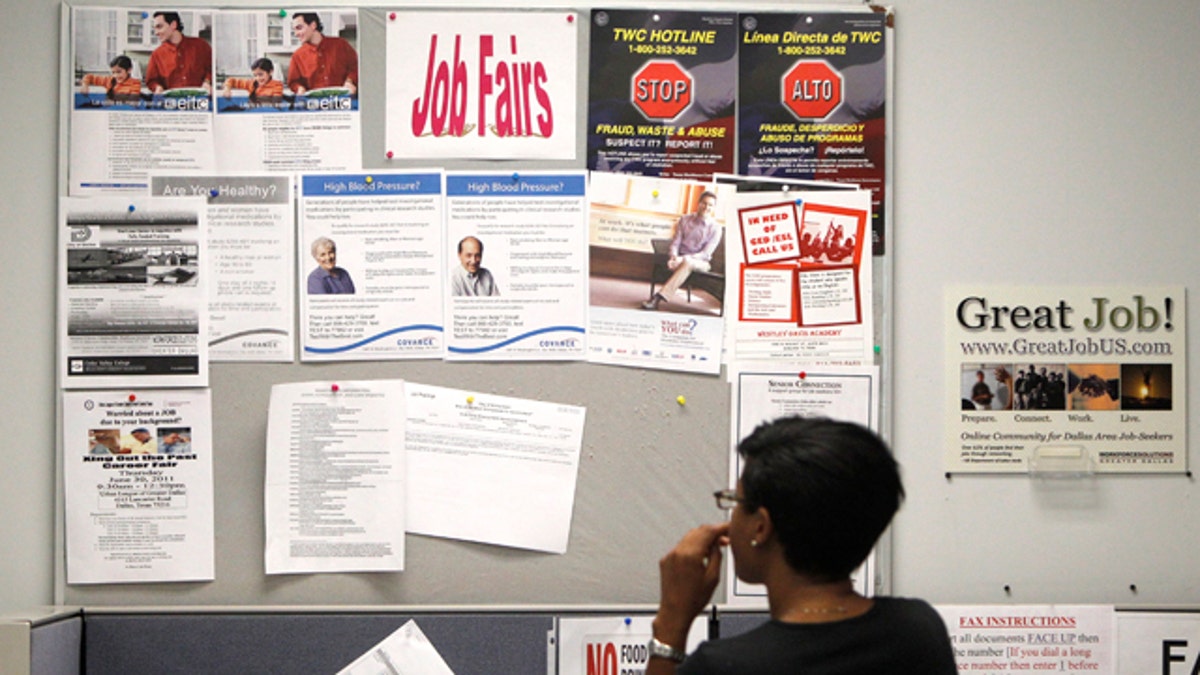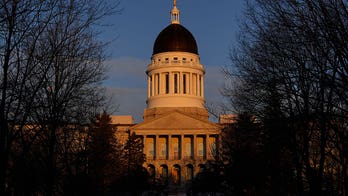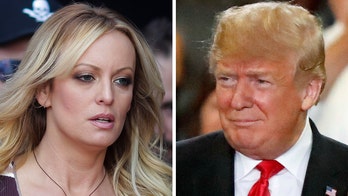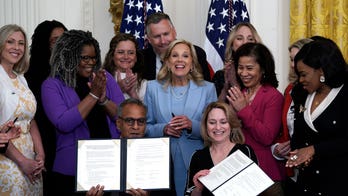
July 5: A job seeker looks at a bulletin at the Texas Workforce Commission's Workforce Solutions of Greater Dallas job resource center in Richardson, Texas. (AP)
With the economy showing no signs of a quick recovery, states are trying to figure out how to weather the financial storm as a new fiscal year begins this month for most of them.
Forty two states and the District of Columbia have closed, or are trying to close $103 billion in budget gaps for the new fiscal year and their options for tackling shortfalls are shrinking with President Obama's stimulus package starting to run dry, according to the Center on Budget and Policy Priorities.
The five states facing the darkest economic outlook are New York (50), Vermont (49), Maine (48), California (47), and Hawaii (46), according to a new study by the American Legislative Exchange Council (ALEC).
The five states with the brightest outlook are Utah, South Dakota, Virginia, Wyoming and Idaho.
The fourth edition of Rich States, Poor States: ALEC-Laffer State Economic Competitiveness Index based its economic outlook ranking on 15 policy variables, including tax burdens, legislated tax changes, regulatory burdens and labor policy.
For example, New York's top personal income tax rate of 12.6 percent ranks last among the 50 states as does its top corporate income tax rate of 15.9 percent. It is also last in recently legislated tax changes and in the estate tax category.
By contrast, Utah's state minimum wage of $7.25 ranks first. It's also first in the right-to-work state category, which means it prohibits labor unions from requiring members to pay dues.
The study also ranks the economic performance of all states based on 10 years of economic data up to 2009 that includes income, population and job growth. On that list, the five worst-performing states are Michigan (50), Ohio (49), Illinois (48), Indiana (47) and California (46).
Jonathan Williams, director of ALEC's Tax and Fiscal Policy Task Force, said the collapse of the domestic auto industry helped drag down the economic performance of Michigan, Ohio and Indiana. He believes the Republican administrations in those states will help turn their fortunes around.
But he pointed to Illinois as a "state that has moved in the wrong direction when it comes to overall economic competitiveness."
Earlier this year, Illinois raised its income tax from 3 to 5 percent – a 66 percent hike -- and its corporate tax from 7.3 to 9.5 percent after facing a $15 billion budget shortfall.
But Williams says that won't be enough to cover its unfunded pension liability, which is the highest in the nation, and that raising taxes so high will only drive businesses to other states.
"I think the consensus across the country is Illinois is closed for business until further notice," he told FoxNews.com.
The five best-performing states are Wyoming, Texas, Montana, North Dakota and New Mexico. Williams said what these states have in common are low or no income taxes and strong population growth.
"I think Wyoming and Texas being No. 1 and 2 is no coincidence," he said. "They have gotten it right in avoiding income tax."
But others have a different view of the fiscal condition states are in and the economic policies they're using.
Elizabeth McNichol, a senior fellow at the Center on Budget and Policy Priorities, said that states that are focusing exclusively on spending cuts to balance their budgets without raising taxes "are going to be in trouble in the future."
"The actions they take by cutting spending could hurt the economy," she said.
She agreed that Michigan is in pretty bad shape but she also pointed to New Jersey, Florida and Ohio – all states with Republican governors – that are not taking a balanced approach.
"The states that have not looked to revenue increases and want to cut taxes even more, like Michigan, are digging themselves into a deeper hole," she said.
She said states like Texas and Wisconsin need to invest in education and health care when people are losing their jobs.
"I think it's shortsighted to say in order to deal with an economic downturn, we need to cut spending," she said. "Shrinking state spending also creates job losses in the public and private sector.




